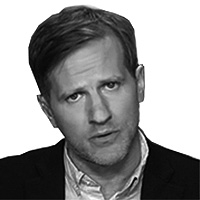Of the compounding mysteries of the Gen. David Petraeus affair (Why was the president informed of the investigation so late? How do people in Tampa become honorary consuls of the South Korean government?), the most confounding question also is perhaps the most overlooked. Pundits and reporters habitually declare that Paula Broadwell, Petraeus’s biographer and sometime paramour, was not only bedding her hero but being “mentored” by him. What is not often asked, though, is why a hugely accomplished woman—with a credulous husband and two kids—needed a mentor in the first place.

Those of us guiltily following the sordid twists and ribald turns of this story are aware of Broadwell’s mantel full of trophies. She was high-school homecoming queen, attended West Point, competes in triathlons, received a master’s degree from the University of Denver, and worked toward a second one from Harvard. Well, yes, she was asked to leave Harvard’s doctoral program (resuming her studies at King’s College in London), but how many people do you know clever enough to be kicked out of America’s most prestigious university? And according to a report in Politico, Broadwall even considered running for Senate in North Carolina, an idea that Petraeus apparently mentored her out of.
Despite this rather impressive résumé, Broadwell decided she needed career guidance from the man tasked with executing the troop surge in Iraq and commanding American forces in Afghanistan. Here is Broadwell speaking at the University of Denver, discussing time she spent with Petraeus before he took control of the CIA: “I had access to everything. It was my responsibility not to leak it, not to violate my mentor, if you will, I was writing about a very close mentor.” On another occasion, she described Petraeus as an “academic mentor of mine, if you will.”
Well no, I won’t.
It’s unclear what the word “mentor” means in this context, beyond hero worship, reckless infidelity, and the purloining of classified material. Washington’s political culture is a thicket of euphemism, and it seems that being “mentored” has become synonymous with aggressive social climbing. And here I was, assuming that the average mentor is an idealistic, bearded Oberlin graduate intervening on behalf of a disadvantaged teenager. Apparently, everyone has a mentor these days.
Clicking through the celebrity-obsessed regions of the Internet, an interested reader will learn of Gwyneth Paltrow’s former mentorship with Madonna, who works in a different artistic medium, and Hollywood executive Harvey Weinstein, who finances films but doesn’t act in them. Why would the wealthy, beautiful daughter of Blythe Danner and Bruce Paltrow need mentoring by two nonactors? Well, it’s good to be on friendly terms with pop stars and movie producers. And directors of Central Intelligence.
Let’s remember, too, that mentors aren’t always a good thing. Patty Hearst was mentored by the Symbionese Liberation Army. Lenin mentored Stalin. Sonny mentored Cher. And according to a deeply unscientific dive into various news databases, the two most discussed mentors of 2012 were General Petraeus and former Penn State football coach Jerry Sandusky (CNN headline: “Prosecutors: Coach went from mentor to predator”).
If Broadwell were a journalist, her “mentor” would be deemed a “source,” but she is more stenographer than hack (she employed a Washington Post editor to ghostwrite All In, her Petraeus hagiography). And besides, reporters aren’t allowed to sleep with their sources, so mentor is a helpful euphemism.
One National Public Radio host declared herself “annoyed” that the Petraeus scandal might cast a pall over all male-female mentor relationships. But allow me to suggest a potential upside: there is a vanishingly small chance that the Broadwell-Petraeus affair might do irreparable damage to the mentor industry, which is about as useful as the holistic medicine industry.
I hadn’t previously noticed, but bookstore shelves heave with guides to mentoring both the wayward and ambitious: Mentoring Leaders: Wisdom for Developing Character, Calling, and Competency; A Game Plan for Life: The Power of Mentoring; Monday Morning Leadership: 8 Mentoring Sessions You Can’t Afford to Miss. The American Psychological Association (APA) website offers a number of self-evident “tips for mentors” (though it’s not entirely clear why). “You may want to reflect back on your school experience,” says the APA sagely, “and identify information that would have proven useful to you back then.” A writer at Forbes provides three tips towards being a great mentor, including this bombshell revelation: “Go into your conversation with some ideas you’d like to discuss, but don’t be afraid to stray off course.” Inc. magazine has its own three tips, including the admonitions “listen well” and “focus on action.”
But perhaps the Mentor Industrial Complex isn’t all bad. The wonderfully named David Clutterbuck, a British writer who has written a number books on the subject, offers the following sensible advice on inter-gender mentoring: “Sexual tensions between the two can inhibit the relationship and make it less rewarding than mentoring between two of the same sex.”
Indeed. And next time, Mr. Clutterbuck might want to advise against providing your mentee—of either gender—access to classified documents. But like most of the tips given to potential mentors, that one, too, seems self-evident.






